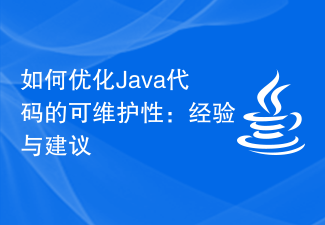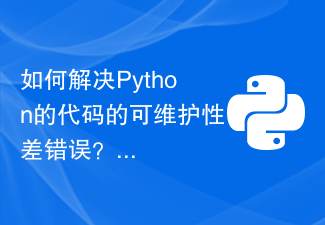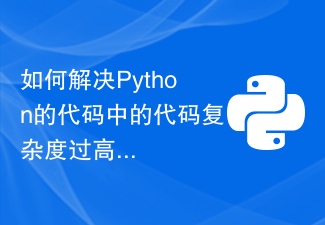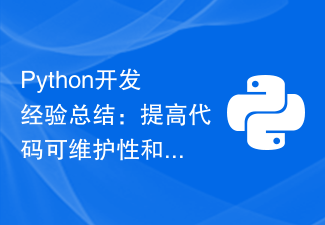Golang functions promote code reuse by organizing code into reusable units. These functions enable code reuse by calling across multiple programs and modules, and enable modularization by grouping related code into functions, each focused on specific responsibilities, helping to break down complex programs and make the code easier to understand. And maintenance.

The role of Golang functions in code reuse and modularization
In Golang, functions are the basic unit of code reuse . They allow you to group blocks of code into independent units that can be easily reused across multiple programs and modules.
Function definition
Golang functions are defined using the func keyword, as follows:
func myFunction(args ...type) (returnTypes ...type) {
// Function body
}-
myFunctionis the function name. -
argsis the argument list passed into the function, the type of which is specified by...type. -
returnTypesis the list of variables returned by the function, the types of which are specified by...type. -
// Function bodyis the body of the function and contains the code to be executed.
Code Reuse
We can reuse code by calling functions in multiple places. For example, in the following code, we create a function that calculates the sum of two numbers and use it to calculate two different pairs of numbers:
func addNumbers(a, b int) int {
return a + b
}
func main() {
result1 := addNumbers(10, 20)
result2 := addNumbers(30, 40)
fmt.Println(result1, result2)
}Modular
Functions can also help break up complex programs, making the code easier to understand and maintain. By grouping related code into functions, we can create modular applications where different functions focus on specific responsibilities.
Practical Case
Consider a shopping website where the total price of each user's shopping cart needs to be calculated. We can use a function to encapsulate this operation as a module, as shown below:
func calculateTotalPrice(cart []item) float64 {
var total float64
for _, item := range cart {
total += item.Price * item.Quantity
}
return total
}
// Usage
func main() {
cart := []item{
{Name: "Apple", Price: 1.0, Quantity: 3},
{Name: "Orange", Price: 2.0, Quantity: 2},
}
totalPrice := calculateTotalPrice(cart)
fmt.Println("Total price:", totalPrice)
}This code creates a calculateTotalPrice function that accepts a list containing the items in the shopping cart as a parameter, and return the total price. In the main function, we define a shopping cart and calculate the total price using the calculateTotalPrice function.
The above is the detailed content of The role of Golang functions in code reuse and modularization. For more information, please follow other related articles on the PHP Chinese website!
 如何优化Java代码的可维护性:经验与建议Nov 22, 2023 pm 05:18 PM
如何优化Java代码的可维护性:经验与建议Nov 22, 2023 pm 05:18 PM如何优化Java代码的可维护性:经验与建议在软件开发过程中,编写具有良好可维护性的代码是至关重要的。可维护性意味着代码能够被轻松理解、修改和扩展,而不会引发意外的问题或额外的工作量。对于Java开发者来说,如何优化代码的可维护性是一个重要课题。本文将分享一些经验和建议,帮助Java开发者提升其代码的可维护性。遵循规范的命名规则规范的命名规则能够使代码更易读,
 如何解决Python的代码的可维护性差错误?Jun 25, 2023 am 11:58 AM
如何解决Python的代码的可维护性差错误?Jun 25, 2023 am 11:58 AMPython作为一门高级编程语言,在软件开发中得到了广泛应用。虽然Python有许多优点,但很多Python程序员经常面临的问题是,代码的可维护性较差。Python代码的可维护性包括代码的易读性、可扩展性、可重用性等方面。在本篇文章中,我们将着重讨论如何解决Python代码的可维护性差的问题。一、代码的易读性代码可读性是指代码的易读程度,它是代码可维护性的核
 如何解决Python的代码中的代码复杂度过高错误?Jun 24, 2023 pm 05:43 PM
如何解决Python的代码中的代码复杂度过高错误?Jun 24, 2023 pm 05:43 PMPython是一门简单易学高效的编程语言,但是当我们在编写Python代码时,可能会遇到一些代码复杂度过高的问题。这些问题如果不解决,会使得代码难以维护,容易出错,降低代码的可读性和可扩展性。因此,在本文中,我们将讨论如何解决Python代码中的代码复杂度过高错误。了解代码复杂度代码复杂度是一种度量代码难以理解和维护的性质。在Python中,有一些指标可以用
 如何使用Go语言进行代码模块化实践Aug 03, 2023 am 10:31 AM
如何使用Go语言进行代码模块化实践Aug 03, 2023 am 10:31 AM如何使用Go语言进行代码模块化实践引言:在软件开发中,代码模块化是一种常用的开发方法论,通过将代码划分为可重用的模块,可以提高代码的可维护性、可测试性和可复用性。本文将介绍如何使用Go语言进行代码模块化实践,并提供相应的代码示例。一、模块化的优势提高代码可维护性:模块化将代码分割为独立的功能模块,每个模块负责特定的任务,使得代码更加清晰和易于修改。提高代码可
 vue中什么是模块化Dec 23, 2022 pm 06:06 PM
vue中什么是模块化Dec 23, 2022 pm 06:06 PM在vue中,模块化就是把单独的一个功能封装到一个模块(文件)中,模块之间相互隔离,但是可以通过特定的接口公开内部成员,也可以依赖别的模块(方便代码的重用,从而提升开发效率,并且方便后期的维护)。模块化开发的好处:1、条理清晰,便于维护;2、不会一次将所有数据请求回来,用户体验感好;3、模块之间相互隔离,但是可以通过特定的接口公开内部成员,也可以依赖别的模块。
 Vue大型项目中实现模块化开发指南Jun 09, 2023 pm 04:07 PM
Vue大型项目中实现模块化开发指南Jun 09, 2023 pm 04:07 PM在现代化的Web开发中,Vue作为一款灵活、易上手且功能强大的前端框架,被广泛应用于各种网站和应用程序的开发中。在开发大型项目时,如何简化代码的复杂度,使项目更易于维护,是每个开发者必须面对的问题。而模块化开发,可以帮助我们更好地组织代码,提高开发效率和代码可读性。下面,我将分享一些在Vue大型项目中实现模块化开发的经验和指南:1.分工明确在一个大型项目中
 Python开发经验总结:提高代码可维护性和可扩展性的实践Nov 22, 2023 pm 12:22 PM
Python开发经验总结:提高代码可维护性和可扩展性的实践Nov 22, 2023 pm 12:22 PMPython开发经验总结:提高代码可维护性和可扩展性的实践在软件开发过程中,我们经常会遇到需求变更、功能迭代等情况,因此代码的可维护性和可扩展性成为了开发过程中必须重视的问题。特别是在Python开发中,如何提高代码的可维护性和可扩展性成为了开发者们共同关注的议题。本文将会总结一些提高Python代码可维护性和可扩展性的实践,希望可以给Python开发者们带
 如何解决Python的代码的可扩展性差错误?Jun 25, 2023 am 09:51 AM
如何解决Python的代码的可扩展性差错误?Jun 25, 2023 am 09:51 AMPython作为一门高级编程语言,被广泛应用于数据分析、机器学习、Web开发等领域。然而,随着代码规模不断扩大,Python程序的可扩展性问题也逐渐显现出来。可扩展性差错误是指Python程序在某些情况下不能很好地适应需求变化,无法对大规模数据进行处理,导致程序运行效果不佳。太多的依赖、糟糕的代码结构、缺乏文档等都是Python程序可扩展性差错误的罪魁祸首。


Hot AI Tools

Undresser.AI Undress
AI-powered app for creating realistic nude photos

AI Clothes Remover
Online AI tool for removing clothes from photos.

Undress AI Tool
Undress images for free

Clothoff.io
AI clothes remover

AI Hentai Generator
Generate AI Hentai for free.

Hot Article

Hot Tools

ZendStudio 13.5.1 Mac
Powerful PHP integrated development environment

WebStorm Mac version
Useful JavaScript development tools

Notepad++7.3.1
Easy-to-use and free code editor

mPDF
mPDF is a PHP library that can generate PDF files from UTF-8 encoded HTML. The original author, Ian Back, wrote mPDF to output PDF files "on the fly" from his website and handle different languages. It is slower than original scripts like HTML2FPDF and produces larger files when using Unicode fonts, but supports CSS styles etc. and has a lot of enhancements. Supports almost all languages, including RTL (Arabic and Hebrew) and CJK (Chinese, Japanese and Korean). Supports nested block-level elements (such as P, DIV),

MinGW - Minimalist GNU for Windows
This project is in the process of being migrated to osdn.net/projects/mingw, you can continue to follow us there. MinGW: A native Windows port of the GNU Compiler Collection (GCC), freely distributable import libraries and header files for building native Windows applications; includes extensions to the MSVC runtime to support C99 functionality. All MinGW software can run on 64-bit Windows platforms.





